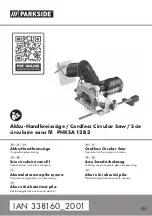
31
▶ Mounting Applications
Be certain the miter
saw
is
mounted
or
placed on a level, firm work surface before
using.
A level and firm work surface reduces
the risk of the miter saw becoming unstable.
▼ WORKBENCH PERMANENT
ATTACHMENT
1.
Each of the four mounting holes should be
bolted securely using 5/16" bolts, lock
washers and hex nuts (not included).
2.
Locate and mark where the saw is to be
mounted.
3.
Drill four 5/16" diameter holes through
work-bench.
4.
Place the miter saw on the workbench,
aligning holes in base with holes drilled in
workbench. Install bolts, lock washers and
hex nuts.
▼ ALTERNATE ATTACHMENT
The smaller mounting holes at each corner
can be used for nails or longer drywall
screws.
The supporting surface where the saw is to
be mounted should be examined carefully
after mounting to ensure that no movement
can occur during use. If any tipping or
walking is noted, secure the workbench or
stand before operating the miter saw.
Be careful not to over-
drive nail or over-torque
the bolt. This could crack foot or damage
base.
Figure 28. Workbench Mounting
▼ TEMPORARY MOUNTING USING CLAMPS
•
If necessary, clamp the miter saw to a
workbench or table top.
•
Place two or more “C” clamps on the
clamping areas and secure (see Figure 29).
There are clamping areas at all four corners
of the saw.
•
Mounting with clamps may prevent access
to some wide miter angles.
Figure 29. Temporary Mounting Using Clamps
Bolt Hole
Nail Hole
Rear
Mounting
Holes
Clamping
Area
Clamping Area
Transporting and Mounting
2610051885.qxp_CM10GD 12/3/18 8:49 AM Page 31
















































